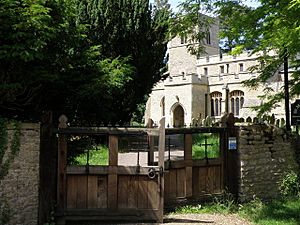Church of St Mary, Stevington facts for kids
Quick facts for kids St Mary the Virgin Church |
|
|---|---|
| St Mary The Virgin Parish Church, Stevington | |

St Mary the Virgin Church, Stevington
|
|
| Country | England |
| Denomination | Church of England |
| Website | http://www.stmarystevington.org.uk |
| History | |
| Status | Parish church |
| Dedication | St Mary the Virgin |
| Architecture | |
| Functional status | Active |
| Administration | |
| Deanery | Bedford |
| Archdeaconry | Bedford |
| Diocese | St Albans |
| Province | Canterbury |
The Church of St Mary is a very old and important church located in Stevington, Bedfordshire, England. It is a Grade I listed building, which means it is considered to be of exceptional historical interest. The church became a listed building on July 13, 1964. It serves as the main parish church for the area and is part of the Church of England's Diocese of St Albans.
Contents
History of St Mary's Church
The first church building on this spot began around the year 880 AD. The tower you see today is actually part of that original, very old structure. The rest of the church was built later, with most of it finished by about 1480.
Major Changes Over Time
The church had a big renovation in 1872. This work was paid for by the Duke of Bedford, who was a very important person in the area. He was the "Patron" of the church until 1971, which meant he supported it financially.
Church Leadership and Staff
Since the early 1980s, St Mary's Church has not had a full-time priest. Instead, it has relied on "Non-Stipendiary" ministers. These are priests who do not receive a salary for their church work. The church is currently in a period called "interregnum." This means it is waiting for a new permanent priest to be appointed. The last priest, Reverend David Hunter, left his role in 2006.
Interesting Facts About the Church
The churchyard of St Mary's holds a fascinating secret. It is believed that the valet (a personal servant) of Napoleon Bonaparte is buried there. This valet was with Napoleon during his exile on the island of St Helena. However, the church records are not complete, and the brick tomb is too old and worn to be sure.
Inside the Church Building
Inside the church, you can see some beautiful old carvings. The "pew ends" (the decorative parts at the end of the wooden benches) are from the Tudor period and are very detailed. There is also a special wooden screen called a "rood screen," which used to separate parts of the church. It has now been moved to the tower.
See also
- Grade I listed buildings in Bedfordshire
External links
- St Mary The Virgin Church website
 | Bayard Rustin |
 | Jeannette Carter |
 | Jeremiah A. Brown |

